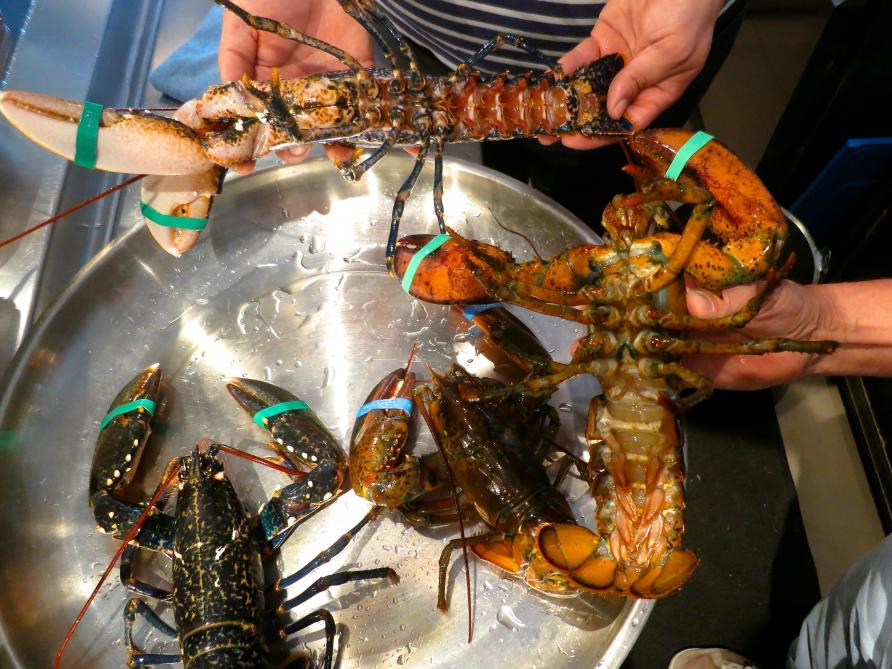Belgium is the largest consumer of lobster per capita in the world - live lobsters are found for sale in supermarkets across Belgium. But when supermarkets sell live lobsters, they are giving consumers free reign over how they transform this live animal into meat.
In Brussels, 85% of consumers who kill lobsters at home choose to boil the animal alive, while 15% cut the live lobster in half. These two methods, whilst the traditional ways of killing lobsters, are subject to immense scrutiny from animal rights activists and scientists alike.
Many assume that, since lobsters have a different brain structure to humans, they cannot feel pain. Conventional wisdom dictates that if an animal does not have the same pain receptors as humans, it therefore cannot suffer in the way that humans do.
However, this logic fails to take into account the basic evolutionary need to feel pain. It also ignores the fact that, across the spectrum of evolution, animals have evolved a variety of different anatomical structures with the same functions. For example, crustaceans have completely different eyes to humans, and yet, they can see.
And so, despite their hugely different anatomy to humans, lobsters can feel pain.
Indeed, a comprehensive study of eight scientific criteria of sentience carried out by LSE found the live boiling of large decapods to be an inhumane slaughter method. The study concluded with a recommendation by the authors to ban boiling lobsters alive. Here are some things to think about before you next boil a lobster for dinner.
1. Lobsters experience the world through touch
Lobsters do not have great eyesight, and instead use the thousands of hairs on their shells and limbs to get a grip on their surroundings. These hairs are incredibly sensitive. If your whole world is perceived through your sense of touch, what must it feel like to be boiled alive?
2. Lobsters are very sensitive to temperature changes
Lobsters have been found to be able to detect temperature changes of just one degree. They have a strong preference for cooler sea temperatures, of 0-25°C. Lobsters even migrate up to 160km each year in response to changing climates.
Just imagine, then, what a boiling pan of water must feel like to an animal which is that temperature-sensitive.
3. Lobsters cannot go into shock
If you have ever been in extreme pain, you might have gone into shock. Unfortunately, lobsters are not so lucky. When lobsters are being maimed or slowly boiled alive, they have no ability to escape the pain that they are in. They feel everything until they die (and sometimes even after - a lobster’s nervous system can function up to one hour after being dismembered).
4. Lobsters try to escape the pan when being boiled alive
If you’re tilting it from a container into the steaming kettle, the lobster will sometimes try to cling to the container’s sides or even to hook its claws over the kettle’s rim like a person trying to keep from going over the edge of a roof. And worse is when the lobster’s fully immersed. Even if you cover the kettle and turn away, you can usually hear the cover rattling and clanking as the lobster tries to push it off. Or the creature’s claws scraping the sides of the kettle as it thrashes around. The lobster, in other words, behaves very much like you or I would behave if we were plunged into boiling water (with the obvious exception of screaming). -David Foster Wallace, Consider The Lobster
Writing in 2005, long before studies had found scientific evidence of lobster suffering, essayist David Foster Wallace described the reaction of lobsters when being boiled alive. As he writes, “it takes a lot of intellectual gymnastics and behaviourist hair-splitting not to see struggling, thrashing, and lid-clattering as just such pain-behaviour.”
I invite readers to consider the above evidence when next preparing a lobster meal. But further than that, I look to the Belgian supermarkets which sell live lobsters.
By allowing consumers to kill lobsters themselves, Belgian supermarkets are complicit in the immense suffering inflicted upon these animals. I therefore call these supermarkets to stop selling live lobsters.


